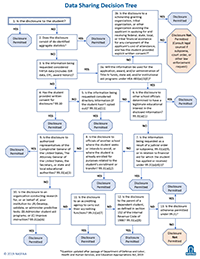Data Sharing Decision Tree Updated to Reflect Expanded Allowable Data Sharing
By Karen McCarthy, NASFAA Policy & Federal Relations Staff
 NASFAA’s popular Data Sharing Decision Tree has been updated to reflect legislative language in the final fiscal year (FY) 2019 spending bill that expands allowable sharing of FAFSA data.
NASFAA’s popular Data Sharing Decision Tree has been updated to reflect legislative language in the final fiscal year (FY) 2019 spending bill that expands allowable sharing of FAFSA data.
The legislation reaffirms and expands language in the FY 2018 spending bill that provided a legislative "fix," advocated for by NASFAA, to address a FAFSA data-sharing issue that had plagued students, financial aid administrators, scholarship providers, and other entities for over a year. The language adopted in March of 2018 applied only to institutions sharing student FAFSA data with scholarship providers and tribal organizations. The new expanded language is much broader, and allows an institution to share individual FAFSA data — with the student's written consent — with an organization "assisting the applicant in applying for and receiving Federal, State, local, or tribal assistance that is designated by the applicant to assist the applicant in applying for and receiving financial assistance for any component of the applicant's cost of attendance."
Examples of scenarios where FAFSA data sharing is now allowable with the student’s written consent include, but are not limited to, applications for means-tested food and housing assistance programs.
The legislation is considered self-implementing, and the Department of Education (ED) has no current plans to issue specific guidance on this provision.
NASFAA encourages schools to implement this provision to assist students as they seek various sources of funding to cover educational costs. As always, be mindful of companies seeking FAFSA data for financial gain, or that otherwise may not have students’ best interests in mind.
Download Data Sharing Decision Tree
Publication Date: 1/10/2019






You must be logged in to comment on this page.